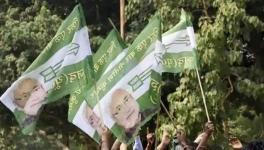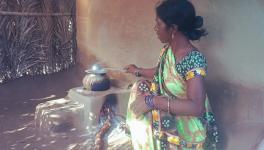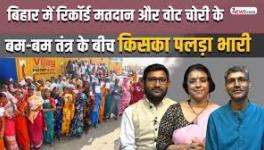COVID-19: Govt’s Failure to Create Awareness Leading to Fear of Vaccines Among Musahars in Bihar
Phulwari Sharif/Danapur (Bihar): “Hum corona ka suee (tika) nahi lenge, hum log thik hai. Suna hai tika lene se bimar ho jayenge aur mar jayenge (We will not take the COVID-19 vaccine, we are healthy. We heard that after taking vaccine people fall sick and die),” these were the words of Bhola Manjhi, who belongs to one of the most marginalised groups in Bihar, the Musahar community.
His words express not only the lack of awareness about COVID-19 vaccination, but also the deep mistrust of the public healthcare system that runs across the poor and marginalised communities in Bihar and the rest of India.
Sitting on grass barely 10 feet from the road near Bhusaula in the outskirts of the capital city, Bhola, in his early 40s, is among thousands of people who have been left out of the awareness campaign about COVID-19 and the importance of vaccination. A farm labourer, Bhola is convinced by the rumours that the vaccine does more harm than benefit. He said, “What is the use of taking vaccine if it can make me sick? Some people have told me that they saw videos on their mobile phone that several people have died after taking the vaccine.”
Bhola’s neighbour Rohan Manjhi, in his late 30s who does odd jobs to earn his livelihood, echoed similar sentiments saying, “My close relatives have cautioned me not to take the vaccine as they will harm us. I refused to take the vaccine last Sunday when a mobile vaccine van visited the locality.”
Located just 1.5 km from AIIMS Patna, the Musahar Toli in Bhusaula is an example of the government’s failure to spread awareness about the deadly pandemic among this marginalised community. According to Bhola and Rohan, no case of COVID-19 infections have been reported among Musahars till date.
While Musahars are considered outcastes and their contact with people outside their community is limited by the social constraints, the claim of not a single Musahar being affected by the virus can be attributed to the lack of testing and access to medical facilities among them than any other reason.
For Sumitra Devi, resident of the Hasanpur Musahar toli in Phulwari Sarif, the uncertainty of their livelihood amid the ongoing lockdown is a bigger concern than COVID-19 and vaccination. Sitting on the mud floor outside her one room thatched hut near an open dirty drain she awaits her husband who has gone to the nearby village in search of work so that they can afford some rice for their family of seven.
“Hum corona-pharona ka suee (tika) nahi lenge, hum log thik hai. Tika lene ka koi jaroorat nahi hai hum chuha, suaar aur ghenga khane walo ko corona kuch nahi karega, sarir under se mazboot hai (We will not take COVID-19 vaccine as we are healthy. We don’t need to take the vaccine as our bodies are strong. Corona cannot harm people like us who consume rats, pigs and snails),” she said.
Sumitra Devi’s statement that COVID-19 cannot harm their community indicates the condition of Musahars across the state, who are worried about their livelihood more than anything.
Asharfi Sada, president of the Musahar Vikas Manch, which works to raise awareness among the community, said that the landless dalit community, referred derogatorily as ‘rat eaters’ by the upper castes, are still considered untouchable. “Their socio-economic status has not changed much in the past few decades, which is why they are not able to think beyond the immediate concern of food and livelihood,” he said, adding, the community has remained outside the purview of government schemes for the most part, aggravating their distress.
In Bihar, 96.3% of Musahars are landless and 92.5% work as farm labourers. The figures have not changed much since the 1980s. Literacy in the community is 9.8%, the lowest among dalits in the country. Hardly 1% of Musahar women are literate.
The plight of Musahars can be imagined from the fact that they are still not allowed to live anywhere in Bihar except in hamlets earmarked exclusively for them. They live in unhygienic conditions, surrounded by pigs and open piles of filth and garbage around. The community is far, far away from mainstream and continues to languish at the bottom-most rung of the caste and class hierarchy.
According to Sudha Verghese, a Padma award winner, who has been working among the community for over three decades, the Musahars have been left out of public healthcare system for long, leading to their deep mistrust of the system. She claimed, “There is hardly a functional health centre in their hamlet. Further, the government has made zero efforts to create any awareness among them about the disease and the importance of the vaccine.”
Her statement is supported by the residents of the Jamsaut Musahar toli in Danapur block said that not a single health official has visited their area in the past one year for conducting any COVID-19 tests. Except some Accredited Social Health Activists who visit their village once in a few months, the area remains cut off from any access to public healthcare.
Verghese also expressed fear about community spread of COVID-19 among the Musahars and the impact it could have on the community. “The government must find some way to convince the people to go for vaccination. As it is, these people are hardly wearing masks, nor do they follow social distancing, hand washing or sanitisation due to the lack of knowledge about COVID-19 guidelines,” she added.
The case of Musahars indicate their complete neglect by both the government as well as non-government organisations - there is no awareness campaign, no attempt to distribute and convince them about masks or sanitisers or other things. While there are several NGOs claiming to work for the community, they have so far failed to create awareness or provide access to basic sanitation and medical facilities even amid the pandemic.
Get the latest reports & analysis with people's perspective on Protests, movements & deep analytical videos, discussions of the current affairs in your Telegram app. Subscribe to NewsClick's Telegram channel & get Real-Time updates on stories, as they get published on our website.
























